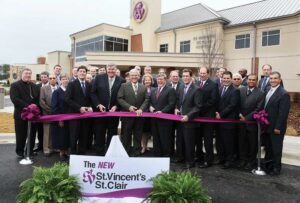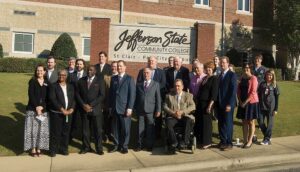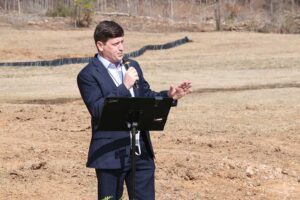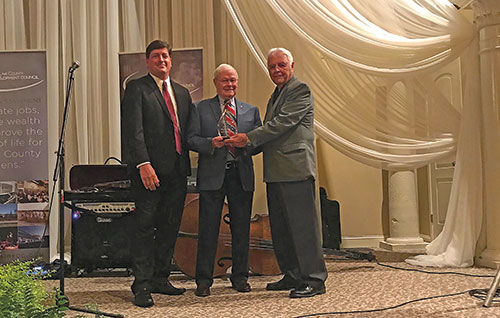
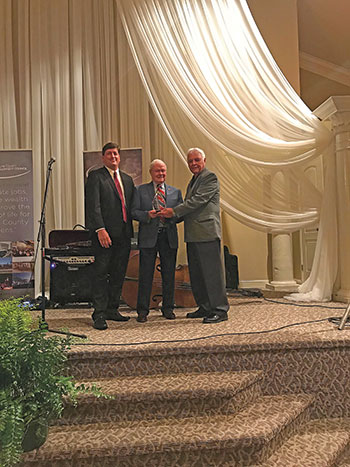 Handed over the blueprints for success
Handed over the blueprints for success
Story by Paul South
Submitted Photos
“Where there is no vision, the people perish.”
— Proverbs 29:18
For most, visions of economic development mean shiny, sleek sedans slowly rolling off assembly lines.
But Ed Gardner Sr. envisioned St. Clair County’s economic boom not just in big manufacturing, but in cozy convenience stores, fueled by gasoline, soda and snacks.
Local entrepreneur Bill Ellison remembers Gardner’s first retail project, a convenience store on the I-20 corridor. The area would later grow to include a Wal-Mart Superstore and a wealth of other retailers, restaurants and motels.
Ellison recalls a ceremony announcing the project, the biggest he’d undertaken.
“Ed Gardner got up there and basically, he said, this project was going to change the whole way of life as Pell City knows it. It was going to be so important to the community, it was going to be about a way of life. It was going to be about better city services. It was going to be about public parks. It was going to be about all the things they could do with that money (tax revenue) that would start coming in off of that development. They would have extra money to do things to make this a better community, and it actually turned out that way.”
Indeed, it did. And the seed planted by that small retailer, and the recruitment of big manufacturers across the county, would lead to public parks, better public access to Logan Martin Lake and the Coosa River, the CEPA Center, more money for education and emergency services. Higher wages and better benefits for the county’s people in turn boosted the real estate market.
Gardner, now 82, the recipient of the 2018 Chairman’s Award from the St. Clair County Economic Development Council, is quick to downplay his role. While he was honored by the award, he says it was undeserved.
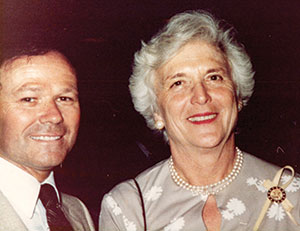 The award is given annually to a person who has gone above and beyond in their support of economic development in St. Clair County. “These are private citizens – not public officials – who are out there trying to make this county better,” said current St. Clair County Economic Development Council Executive Director Don Smith.
The award is given annually to a person who has gone above and beyond in their support of economic development in St. Clair County. “These are private citizens – not public officials – who are out there trying to make this county better,” said current St. Clair County Economic Development Council Executive Director Don Smith.
“I’ve always looked at that as, I was paid for everything I did. Like when I was nominated Citizen of the Year, I didn’t think it was fair. The things that I have accomplished are what I’m supposed to be doing. That’s my job, it’s what I’m supposed to be doing. I get up every morning, every day with that in mind, that this is what I’m supposed to accomplish. Awards like that are for people who give of their time, not people who are paid for their time.”
He adds, “It’s a great award, and I’m extremely proud to receive it. And it certainly makes me feel good that the people that I’ve known for the 19 years that I’ve been here, feel toward me that they would want to acknowledge what I have done with a ceremony and a way to commemorate it. It’s a tremendous honor and one that I really don’t feel that I necessarily deserve.”
His resume’ and those who have known Gardner through the years would quickly disagree.
Consider just a few of his accomplishments: Director of the Alabama Department of Economic and Community Affairs in the second administration of then-Gov. Fob James, Assistant Secretary of Housing and Urban Development under the late Jack Kemp. He also served in regional leadership roles for HUD in Birmingham, Atlanta, Florida and Oklahoma City.
He played a key role in Alabama’s burgeoning automobile industry, helping continue the Mercedes Benz project in Tuscaloosa County, and later Honda in Lincoln and the industries that would spin off the auto industry, benefitting all of St. Clair County. And that is just the tip of the iceberg.
Those who have come to know Gardner over his 19 years in St. Clair County are quick to disagree with his claim that the Chairman’s Award is undeserved. They contend he is the foundation for economic prosperity that St. Clair County has enjoyed in recent years. Its ranking as one of the fastest-growing counties in the state was built in large part, they say, through Gardner’s efforts.
And it came because he brought unity to the county’s drive for prosperity. Former Pell City Mayor Guin Robinson said in the late 1990s, local leaders committed to work together, ignoring political turf wars that can kill the best-intentioned ideas in small towns and rural counties. St. Clair has had its share, thanks in part to its geography. Not this time.
“Sometimes the stars align. We had progressive leaders, and we were all committed to do whatever it took to bring the county together around economic development.”
And the biggest piece of the puzzle, many say, was attracting Ed Gardner to St. Clair County.
“The Ed Gardner hire was the biggest the county ever made,” Ellison said. “Forming the EDC and hiring him, I can’t think of anything that’s been more important for this county. Ed always had the right words at the right time. He was an artist with words. He would pick the absolute right word. It was a work of art when Ed spoke.”
Longtime Gardner friend and colleague, local real estate executive Lyman Lovejoy, agrees. Lovejoy still pinches himself when he thinks of how the county landed Gardner for its point person on the economy. He knew how to build confidence and how to bring people together. Lovejoy was on the EDC board for 15 years and was part of the team that interviewed Gardner for the its executive director role.
“He’s got a pedigree that’s unreal. When he was in the interview, he got a phone call and said he had to take it, that it was from then-U.S. Rep. Richard Shelby. I thought it was staged. But it was Richard Shelby. That’s the kind of people he knew.”
The man that holds the job now, EDC Executive Director Don Smith, said that Gardner’s experience at the state and federal level paid dividends.
“It was critical in his ability to come here and have the patience and the temperament to bring everyone together, even if they didn’t want to,” Smith said.
Lovejoy, a past recipient of the Chairman’s Award, added, “He is the one that put us on the road to economic development here in the county. He brought our county together, the towns together, all working the same way for the same purpose.”
Gardner’s philosophy was as simple as the old adage of the rising tide that lifts all boats. A recent informal survey of the county’s major employers revealed that the workforce at each firm came from across the county.
“When you’re talking about jobs, it’s not zip code specific or city specific,” Smith said. “When a company’s expanding with 200 jobs, that’s good for all areas of St. Clair County.”
“He preached a sermon: “Just because they put something in Steele or Pell City, it benefits everybody (countywide),” Lovejoy said. “All the jobs don’t come from Steele or Ashville or wherever. His people skills were unsurpassed.”
And under Gardner’s leadership, St. Clair’s economic development blueprint became a model for other cities and counties.
“Ed validated economic development in St. Clair County,” Lovejoy says. “Other counties would call us and say, ‘How are y’all doing this? Show us what you’re doing.’ That’s going on today.”
Would economic development have transformed St. Clair into one of the state’s fastest growing counties without Gardner?
“It certainly wouldn’t have been as big,” Lovejoy says.
Gardner shies away from an individual spotlight. He will quickly tell you that economic development rests on a two-tiered foundation – teamwork and integrity, doing what you say you’ll do, without excuses.
He will quickly share credit with public and private sector leaders he’s worked with, as well as with his wife of 60 years, Betty, and his children.
And then there is his faith. In their retirement years, the Gardners travel to cities large and small, following their favorite Southern Gospel groups. Whether in Louisville, Ky., or Shipshewana, Ind., or towns near and far, he prefers performers who sing together for the glory of God, not singers who try to bring attention to themselves onstage.
“I’ve always liked gospel music, but I have never liked the demeanor of the most popular groups when they were performing on stage. To me, it ought to be a worship experience.”
Economic development is the same way, he says – perfect shared harmony. And every shared success is granted by the Almighty.
His career of success has also endured pain.
Gardner led the Oklahoma City field office of HUD. Days after he left that role in 1995 to return to Alabama, the Alfred P. Murrah Federal Building was bombed in a horrific act of domestic terrorism. Some 168 people died, including 35 of Gardner’s HUD colleagues. Nineteen children being cared for at the America’s Kids Day Care Center in the building, were among the dead. He tries to block out the memory, but it never fades.
Asked how he was impacted by the bombing, Gardner took a long pause. His voice broke and tears came. Those that were lost, he said, “were some of the best people I ever knew. I try to let people know how I feel about them rather than waiting until tomorrow or next week or next month, because . . . because I know that I may not have another opportunity.”
With the Chairman’s Award, Gardner’s adopted home expressed its feelings for him. And while grateful, Gardner’s humility never ceased.
“The thing that I would want people to know is that I never promised anything that I didn’t think I could deliver. And I never committed to anything that I didn’t do my best to complete in an exemplary way.”
He adds: “There’s nothing that I can look back on that can make me look back and say I wish I’d taken this path rather than that path. I tell you, the Lord has been so good to me in giving me a great family that has supported me in times I wasn’t able to be there physically to support them. They never wavered. Therefore, I know I’ve done what I should have done. I am without any doubt, one of the most blessed people that has ever lived.”
And his greatest reward comes not through gleaming plaques or grand ribbon cuttings, but in something more tangible.
“What’s gratifying to me is that when I walk through one of these plants, whether its Honda or Eismann (Automotive, North America) here in Pell City or WKW, and I’m walking through there and I see a man or woman there that I had seen in the past (making minimum wage) and (now) seeing them making a good hourly wage plus benefits, that’s what does more for me than anything else – knowing that their standard of living has really improved.”
Guin Robinson characterized Gardner’s legacy.
“You can have all the necessary things for success,” he said. “But it takes a leader. And it takes someone who can put all the ingredients together. You can call him an architect. You can call him a builder, but Ed put it together. … We all knew we had those things, but we needed someone to put it together. I’m forever thankful and forever grateful that that person was Ed Gardner.”
















